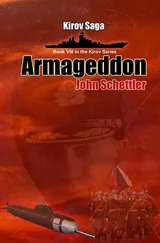When the signal came in to Victorious it was quickly passed on to Tovey on King George V , where it raised far more questions than it answered.
“One ship sighted?” said Tovey. “What kind of ship? A cruiser? A battleship? This information is not clear.”
“I’m sorry, sir,” said Brind, “but it’s all we have for the moment.”
“Bloody pilots need training in proper signals protocol,” said Tovey, obviously unhappy. “Anything from the other planes?”
“Not a word, sir. Oh, the rightmost plane in the search arc sighted Hood and Prince of Wales and signaled two ships—but it wasn’t coded, sir.”
“Not coded? Damn it, Brind! We should have kept the bloody planes on Victorious for all the good this does us. What if the Germans pick up that wireless message?”
“A bit of a mess here, sir,” Brind agreed.
“Very well,” Tovey fumed, thinking. “We’ll hold this course based on the one good sighting we do have. And I think we’d better get Hood and Prince of Wales off to the east somewhat, on a line to join up with us. She was in a good position for dawn, but it’s time we brought them our way. It’s going to be a bit lonesome out here today.”
“I understand, sir. I’ll signal Admiral Holland our intentions and ask him to make his turn as soon as practical.”
“Very well,” said Tovey, still upset with the sloppy reporting from the pilots of Victorious . “It’s likely the Germans suspect they are there in any case.” He had misgivings about bringing the carrier along, and now she seemed more of a liability than an asset. Yet her crews, raw as they were, had done their best and pulled off three missions to give them some salt. It was only fortune and good luck that none of them were killed.
He considered his situation. There was still at least one German ship ahead of him on this course, and very likely two. He didn’t relish the prospect of trying to engage them both on his own. All the more reason to join up with Admiral Holland and his ships. And what about this convoy, WS-8B, another ‘Winston Special’ outbound for Alexandria? It was steaming due south now, and Pound at the Admiralty had taken it upon himself to detach its only significant escort, the battleship Rodney . Her position at midnight had been some 160 miles east southeast of King George V, but he had heard nothing since. The big battleship was too slow for a chase like this, and she would have to be maneuvered with some foresight if he was to have any hope of getting her into the battle.
He considered sending a message asking where Rodney was so he could get his ships in hand and plot proper intercept headings. Yet something cautioned him to maintain radio silence on that issue for the time, at least until he determined what he still had in front of him. The situation was hardly satisfactory, but it was all he had for the moment, and he carried on.
~ ~ ~
Off to the east,the captain of HMS Rodney had called a committee together of all senior officers aboard to consider what he might do. He had been detached from convoy duty on expressed orders from the Admiralty. It seemed Admiral Pound was getting fond of moving ships about on his plotting table, he thought.
Rodney was a middle aged ship, ungainly at sea, yet powerfully built, with nine big 16 inch guns all forward. It was well enough they were placed there, for she was so slow that, more often than not, the ship would be well behind anything she was to fire at.
Her captain, Frederick Dalrymple-Hamilton, was also a big slow man, a tall Scott, powerfully built like his ship. At midnight, just as Tovey and Holland had turned due south to chase Bismarck , his ship was still steaming on a southwesterly course of about 230 degrees. Pound had sent him this heading, but no further instructions, and he realized if he held to this course he would soon find himself well behind the action by the time he got out west closer to Home Fleet.
Orders were orders, yet having misgivings about his lot, he summoned his committee and thought to seek a weight of opinion from his senior officers. He had his navigator, the ship’s commander, and several other officers that had come aboard to gain passage to America. Rodney had been bound for New York, and eventually a berth in Boston where she was to undergo some much needed refitting. Even now her decks were stacked with packing crates filled with equipment and material to be used in patching her up. It was well past time for the old girl to get a facelift, he thought, but the cargo was likely to be a nuisance if he had to go to action stations.
He could avoid all that by just settling in and keeping to this heading. Then he would have a nice uneventful cruise to the States, if he could keep clear of U-boats. The fact that he had to dismiss his destroyer escorts to keep watch on the convoy also worried him.
So he brought in his senior rankings and these two odd interlopers as well, just to see what all the hatbands and stripes would come to in a brief discussion. And one man, the American liaison officer Wellings, was to make a very strong impression on him that night. He was a curious fellow—seemed to want his ear from the moment he set foot on the ship. Well now for it, thought Hamilton. Let him have his say.
HMS Rodney, 00:10 hours, 25 May, 1941
“Well Gentlemen,that’s our present situation,” said Captain Hamilton. “We’ve no further instructions from the Admiralty, but that could change. Your thoughts are, of course, welcome.” He looked at the American, Wellings, as if he knew the man would be the first to speak, and he was not disappointed.
“If I may, sir,” said Wellings. “What’s to be gained by holding this heading? You’ve said yourself that it will put you well behind Admiral Tovey by the time we get out west.” He was a tall, thin man, dark eyed, clean, and dressed out in proper US Navy whites. The stripes on his cuff and shoulder insignia made him to be a Lieutenant Commander.
But Wellings was more than he seemed.
Not long ago insofar as he was concerned, but more than sixty years hence, a man had stepped across a bold thick line painted on a heavy concrete floor, and vanished into a whirl of dizzying light and sound.
He appeared in Bristol, England, near the Clyde anchorage where HMS Rodney had been waiting to escort Convoy WS-8B, the second half of the ‘Winston Special’ series that was bound to reinforce the British position in Egypt. The first half had been designated WS-8A, dubbed the Tiger Convoy by Sir Winston himself, as he deemed its bold move to sail directly across the Med instead of going round the Cape of Good Hope was rather like riding a tiger into the fray by the quickest route possible. There had been a near miss tragedy when the Germans surprised the British and sortied briefly with the battlecruiser Gneisenau .
Luckily Force H was near at hand, sailing north at that very moment to cover the Tiger Convoy, and the cruiser Sheffield , followed soon after by the battlecruiser Renown , engaged the German raider and sent her scurrying back to the safety of her berth at Brest. Sheffield was damaged and laid up in Gibraltar, but Tiger Convoy, part one, passed safely and made her delivery of precious Matilda and Crusader tanks and Hurricane fighters to General Wavell. 57 tanks were lost when the transport Empire Song sang her last after striking a mine, but another 200 tanks were safely delivered, and spurred General Wavell to launch an aptly named operation aimed at relieving the siege at Tobruk.
Читать дальше












